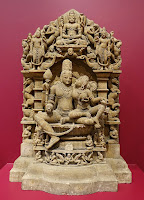 |
Shiva-Parvati (11th century) as Uma-Maheshvara |
Brahma had granted Tarakasura a boon that no one except the son of Shiva and Parvati could kill him. The problem was that Shiva was engaged in deep tapas (extreme austerities and prayers) and he was not ready to notice Parvati. The Gods engaged Kamadeva and Rati, the God and Goddess of love, to arouse Shiva’s passion. But Shiva burnt Kamadeva to ashes. On seeing that Kamadeva and Rati had failed in their mission, Parvati became engaged in deep tapas—her prayers were finally answered and she won Shiva as her husband. Through their union Kartikeya was born and he restored the balance of the universe by slaying Tarakasura.
Kumarasambhava is an epic poem of seventeen cantos—the Sringara rasa (the rasa of love, romance, and eroticism) plays a more critical role in it than the Vira rasa (the rasa of heroism and warfare). A large part of the epic poem is devoted to describing the union between Shiva and Parvati. Kalidasa describes their union as the coming together of the two primordial elements of the universe: Purusha (the spirit or the conscious energy) and Prakriti (the cosmic material that is the root of everything in the universe).
The period of composition of Kumarasambhava is not clear. Most historians believe that Kalidasa lived between the 1st and the 5th centuries CE. Several English translations of Kumarasambhava have been published under the title, The Birth of War God. Here’s an excerpt from the section in which Shiva is describing to Parvati the beauty of the Himalayas (they had come to the Himalayas after their marriage):
See, my beloved, how the sun
With beams that o’er the water shake
From western skies has now begun
A bridge of gold across the lake.
Upon the very tree-tops sway
The peacocks; even yet they hold
And drink the dying light of day,
Until their fans are molten gold.
The water-lily closes, but
With wonderful reluctancy;
As if it troubled her to shut
Her door of welcome to the bee.
The steeds that draw the sun's bright car,
With bended neck and falling plume
And drooping mane, are seen afar
To bury day in ocean's gloom.
The sun is down, and heaven sleeps:
Thus every path of glory ends;
As high as are the scaled steeps,
The downward way as low descends.
No comments:
Post a Comment